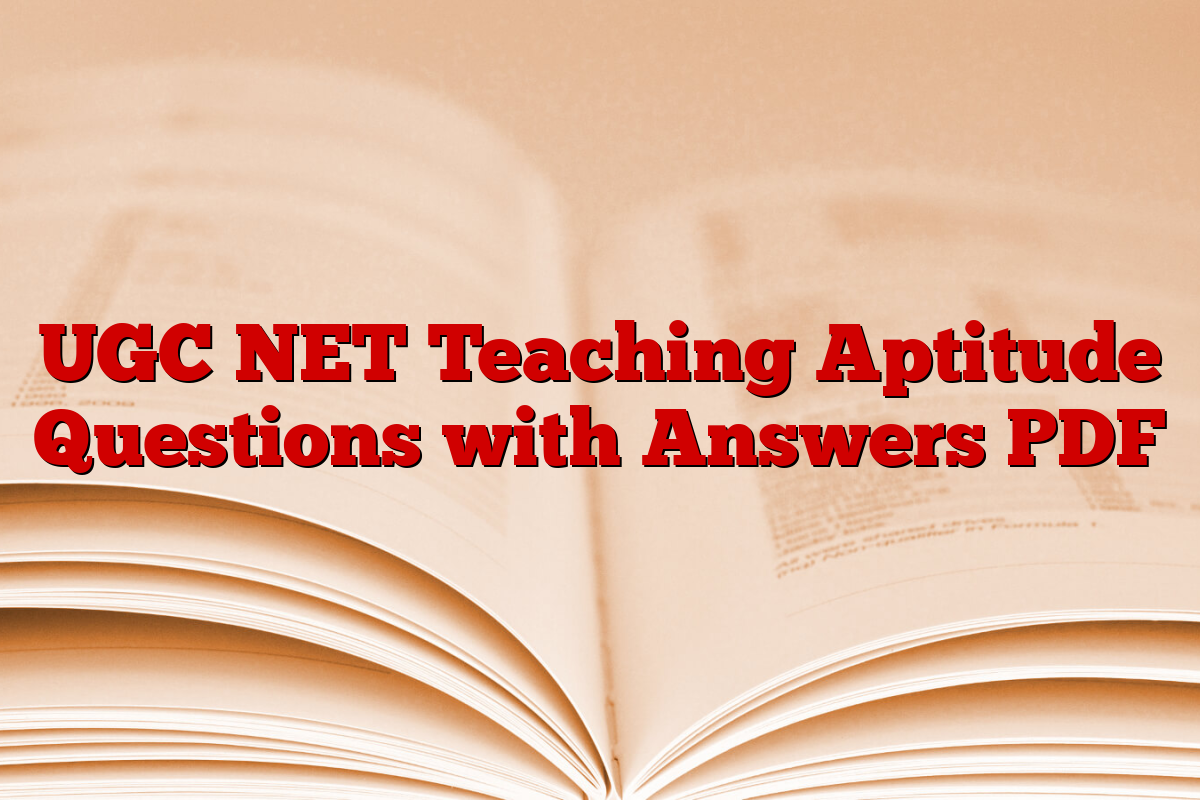UGC NET Teaching Aptitude section assesses your abilities as a future teacher. Teaching Aptitude uses multiple choice questions (MCQs) to test your knowledge in various areas important for effective teaching. These include understanding how students learn (theories of learning), different teaching methods and choosing the right ones for specific situations, and how to effectively assess student progress.
The UGC NET teaching competency section also explores the importance of professional ethics in teaching as well as creating a positive classroom environment through management and communication skills. Here we are providing UGC NET Teaching Aptitude MCQ Questions PDF to help the candidates prepare for the exam.
ugc net teaching qualification
The UGC NET Teaching Aptitude section, although carrying only 10 marks across 5 questions, plays an important role in your overall score. It assesses your competence as a teacher by testing your knowledge of teaching-learning processes.
While a deep understanding of each subject is valuable, the key to success lies in developing your problem-solving skills and taking advantage of your inherent knowledge and abilities in the teaching context.
| ugc net teaching qualification | |
| name of exam | National Eligibility Test (UGC NET 2024) |
| steering body | National Testing Agency (NTA) |
| Examination conducted in a year | twice a year |
| method of examination | Online |
| types of questions | Multiple Choice Questions (MCQ) |
| section | teaching qualification |
| number of questions | 5 |
| total marks | 10 |
| important topics | Teaching, Learner Characteristics, Factors Affecting Teaching, Methods of Teaching in Higher Education Institutions, Teaching Support Systems, Evaluation Systems: |
| negative marking | No |
UGC NET Teaching Aptitude MCQ Questions Download PDF
Here we are providing UGC NET Teaching Aptitude MCQ Questions PDF through the link given below. Candidates can download 50 MCQs PDF for UGC NET Teaching Aptitude Questions here to aid their preparation.
| ugc net teaching aptitude questions | |
| UGC NET Teaching Qualification – Part 1 | download pdf |
| UGC NET Teaching Qualification – Part 2 | download pdf |
| UGC NET Teaching Qualification – Part 3 | download pdf |
ugc net teaching aptitude mcq questions
Q1. Which of the following is not an indication of reading difficulties among young learners?
(A) letter and word recognition
(b) Speed and fluency of reading
(c) understanding words and ideas
(d) spelling consistency
Q2. A teacher wants the gifted children in her class to achieve their potential. Which of the following should he not do to achieve his objective?
(a) Teach them to enjoy non-academic activities
(b) teach them to manage stress
(c) separate them from their peers for special attention
(d) Challenge them to enhance their creativity
Q3. Which of the following is not a characteristic of intrinsically motivated children?
(A) They always succeed
(B) They enjoy doing their work
(c) They display high level of energy while working
(d) They like challenging tasks
Q4. Which of the following is not a suitable tool for formative assessment?
(a) assignment
(b) oral question
(c) term test
(d) quizzes and games
Q5. Learners should not be encouraged to
(a) Ask as many questions as possible inside and outside the classroom
(b) Interacting actively with other learners in group work
(c) Participate in as many co-curricular activities as possible
(d) Remember the answers to all the questions asked by the teacher
Q6. Which of the following statements are the major features of formative assessment?
A. To provide feedback to teachers to adapt teaching strategies to suit the needs of learners.
B. Facilitate active and sustained engagement in learning for students
C. To enhance the learning capabilities of the learner.
D. To contribute to the overall grading and certification of the learner.
E. Summarize how much a student has learned over a period of time.
Choose the correct option:
(A) Only A, B, and C
(B) only B, C, and E
(c) A, B, and E only
(d) A, C, and D only
Q7. With reference to the given statements:
Statement I: The cultural background of a learner has no effect on his learning experience.
Statement II: Gender is not a strong predictor of academic achievement.
Select the correct answer:
(A) Both statement I and statement II are true
(B) Both statement I and statement II are wrong
(c) Statement I is true but statement II is false
(d) Statement I is false but statement II is true
Q8. Which of the following statements does not describe the characteristics of teacher-centred teaching methods?
(A) Students are passive learners
(b) The teacher acts as a facilitator for learning
(c) The teacher directs the learning activities
(d) Learning is based on cooperation among students
(e) Learning is based on the student’s interest
Choose the correct option:
(A) A, C, and D
(B) B and E
(c) B, D, and E
(d) A and C
Q9. Ruhi is shown three pencils and she observes that pencil A is longer than pencil B and pencil B is longer than pencil C. When Ruhi guesses that A is a longer pencil than C, she is demonstrating which feature of Jean Piaget’s cognitive development?
(A) series
(b) protection
(c) transitive thought
(d) Hypothetico – Deductive reasoning
Q10. According to Jean Piaget’s theory of cognitive development, children in the concrete operational stage are able to –
(A) reversibility
(b) Hypothetico – Deductive reasoning
(c) abstract thinking
(d) propositional logic
Solution
S1. Answer(D)
S2. Answer (C)
S3. Answer(A)
S4. Answer (C)
S5. Answer(D)
S6. Answer(A)
S7. Answer(D)
S8. Answer (C)
S9. Answer (C)
S10. Answer(A)
sharing is Caring!
